Frederick W. Yingst – Carpet Dealer of Harrisburg
Posted By Norman Gasbarro on February 2, 2013
Frederick W. Yingst (1843-1920) was the son of Carl Yingst and Anna [Snavely] Yingst, German immigrants who met on shipboard en-route to America. Frederick was born and reared in Harrisburg. According to his biographer, at 16 years old, he became an apprentice in the house and sign painting trade with John Cruikshank, a well-known mechanic.
When the Civil War began, Frederick W. Yingst first waited more than a year to enlist, but on 26 July 1862, he was was mustered into service in the 127th Pennsylvania Infantry, Company A, as a Private. He was discharged on 8 May 1863. He then re-enlisted at Harrisburg in the 194th Pennsylvania Infantry, Company G, as a 1st Sergeant. On 24 July 1864, he was promoted to 2nd Lieutenant and served the remainder of his term until he was discharged on 6 November 1864. His final enlistment occurred on 17 February 1865, when he was mustered into the 78th Pennsylvania Infantry, Company D, as a 1st Sergeant, serving until 2 June 1865 when he was discharged.
The war was over and
…he then returned to Harrisburg and embarked in the furniture and carpet trade, and since that time has been continuously in the business in this city. He was married in Harrisburg, July 4, 1871, to Theresa Youder, daughter of Daniel Youder and Mary [Frank] Youder, and to them has been born four children: Walter H. Yingst, Robert M. Yingst, Anna M. Yingst, and Gertrude A. Yingst, all living and residing in Harrisburg….
In political views he is liberal and independent, voting for men rather than party. Mr. Yingst has been a member of the First Reformed Church for twenty-seven years, of which his wife and family are all members, excepting Walter H.Yingst, who belongs to the Market Square Presbyterian Church. (Commemorative Biographical Encyclopedia of Dauphin County, page 490).
An early furniture store advertisement from the Patriot of 1871 notes that Frederick W. Yingst was operating out of the old “Snavely stand”. One Snavely property, 410 Chestnut Street, which was owned by Frederick’s mother’s family eventually went to estate when Anna [Snavely] Yingst died, and Frederick and his father, acting as executors, sold it at the estate sale in 1880. Prior to this, in 1876, Frederick closed down his business and made plans to leave Harrisburg. Records show that he moved to Kansas, where daughter Gertrude Yingst was born in 1876, but he only remained there a short time.
According to an article that appeared in the Patriot on 19 February 1886, Yingst was in business at a Market Street location for about 5 years and had been in business in the city for a total of 20 years, his first site being at the Snavely stand which was located at 213 North Second Street. The new location, at Market Street and the River Bridge, featured
…acres and acres of carpets, oil cloths. All the colors of the rainbow… Owing to the large patronage extended to him he has constantly been increasing his stock. Buying goods direct from the manufacturers in New York and Philadelphia enables him to compete in price and good styles with all others, a result of making the carpet business a specialty for so many years. When you are in need of anything in the above line don’t fail to call on Mr. Yingst, and be assured of a cordial reception, whether you buy or not….
In the period from about 1881 through 1891, the nephew of Frederick W. Yingst, Charles F. Hoover was in the carpet business with him, although the Hoover name did not appear in the name of the business. Charles F. Hoover (1861-1925) was born during the Civil War to William H. Hoover and Mary [Yingst] Hoover. William H. Hoover, like his brother-in-law, served in three different Civil War regiments. On 2 April 1861, William H. Hooover was mustered into the 2nd Pennsylvania Infantry, Company I, as a private and served the duration of his 3-month term until honorably discharged, 216 July 1861. Later that year on 16 December 1861, he enlisted in the 7th Pennsylvania Cavalry, Company I, as a Private. The record is unclear as to his date of discharge, but the discharge was on a Surgeon’s Certificate of Disability. The final enlistment occurred on 8 February 1864 in the 2nd Pennsylvania Artillery, Company K, as a Private. On 30 April 1864, he was discharged from that regiment, also on a Surgeon’s Certificate of Disability. He did not recover from the latter service and died in 1865, leaving a widow and minor son, Charles F. Hoover.
Charles F. Hoover was able to take advantage of the Whitehall Orphans’ School, Carlisle, Cumberland County, Pennsylvania, where he completed his education, after which he moved to Adebolt, Iowa, where he took up the trade of painter. Returning east, he was employed in the carpet department of John Wanamaker and Company in Philadelphia where he stayed for two years. It was then, in 1881 that he joined his Uncle Frederick in business in Harrisburg. After 1891, he went into the carpet business for himself.
Early-on, Charles F. Hoover tried to establish a reputation for quality products. The Patriot reported on 28 January 1893, that he made a special trip to Millersburg, Dauphin County, to purchase furnishings that were manufactured there for an elaborate restoration and renovation of the bar of the Koehler’s Hotel on North Third Street in Harrisburg.
Charles F. Hoover also effectively used the telephone, combined with print advertising in the newspaper, as the above ad shows, to advertise his wares. As a result, in 1916, the Patriot reported on a overflow crowd at one his his sales:
More than 3000 attend first day’s sale at Hoover Furniture Company…. The crowds became so dense in the late afternoon that the store rooms were so congested it was impossible to admit more persons to the building and the doors had to be closed. Fully 600 waited outside until the crowd inside thinned out. The sale was another striking instance of effective newspaper advertising….
Effective advertising and use of the telephone were not the only forward-looking innovations promoted by Charles F. Hoover, the graduate of the Civil War Orphans’ School, as a headline that appeared in the Patriot noted, 17 May 1920:
Merchant of City Takes 150 Mile Trip in Plane; Enjoys It. Charles F. Hoover is Passenger with Walter Shaffer on Flight from New Jersey Flying Filed to Dauphin – Cover Route in Two Hours. His First Air Voyage at 58; Sorry It’s Over. Describes Appearance of Pennsylvania farms Over Which Machine Carried Him — Lancaster County. “Like Checkerboard,” He Says.
That same year, 1920, it was noted that the wife of Charles F. Hoover, Elizabeth [Bidinger] Hoover, had died. She had helped to found the furniture and carpet store business with her husband, and late in life had gone to embalming school. At the time of her death, she was the only woman who was a licensed undertaker in Central Pennsylvania, working out of son William H. Hoover‘s undertaking business. William was the grandson of the Civil War soldier, William H. Hoover, who had died in the Civil War.
In 1921, the widower Charles H. Hoover, invested in a new business, forming the Harrisburg Airplane Company, along with his son, Robert Hoover. It is not known at this time what became of this company. Charles H. Hoover died in 1925 and is buried with his wife in the Harrisburg Cemetery.
In his later years, Frederick W. Yingst was a manufacturer of anti-dust carpets. In 1910 and 1920, he was living in the household of his son-in-law, J. Emil Anselm (husband of Gertrude Yingst), Cumberland County, Pennsylvania. Frederick W. Yingst died on 3 August 1920. At this time, it is not known where he is buried.
—————————–
News articles are from the on-line resources of the Free Library of Philadelphia. Pension Index Cards are from Ancestry.com.
 ;
;
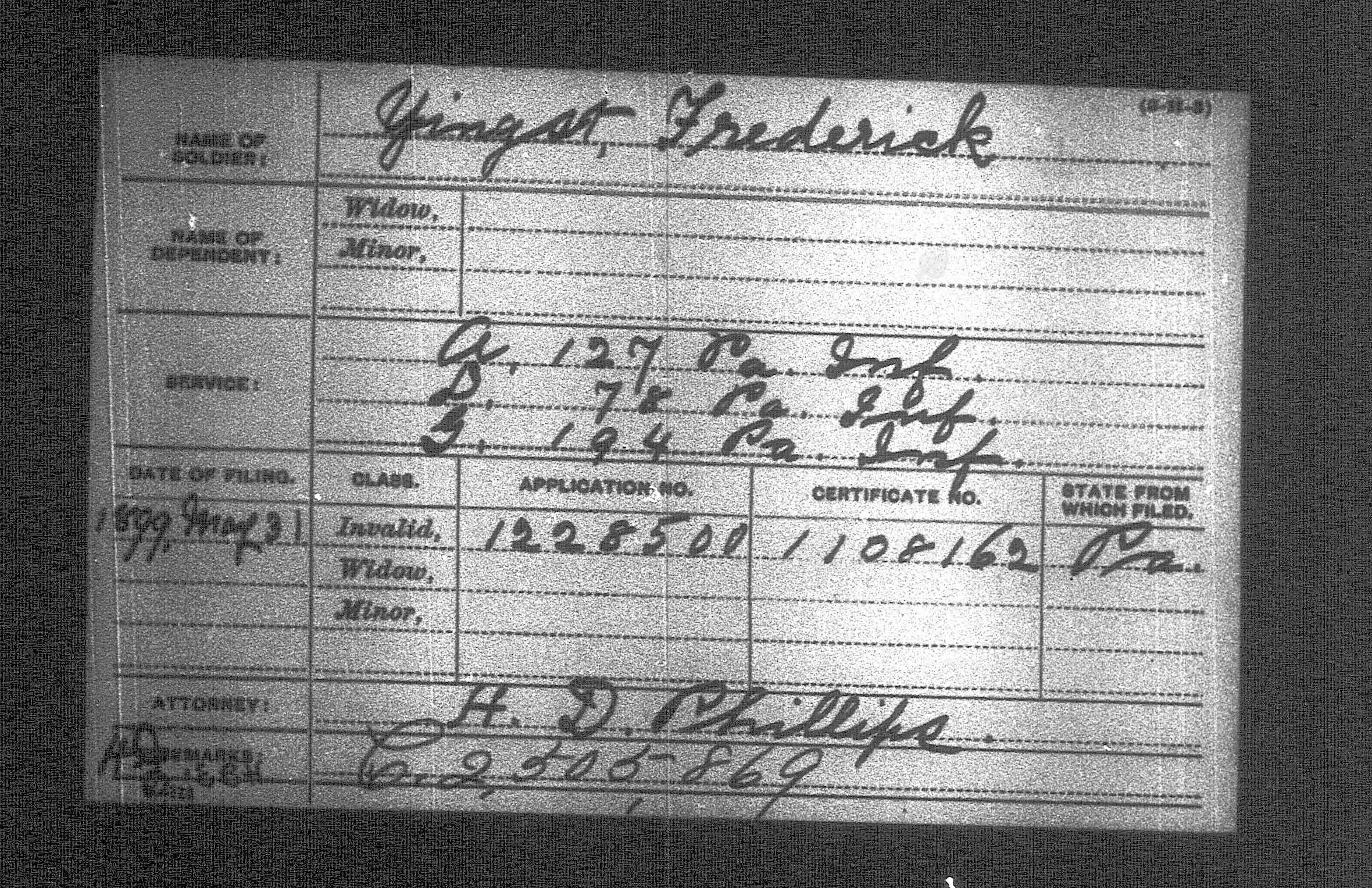
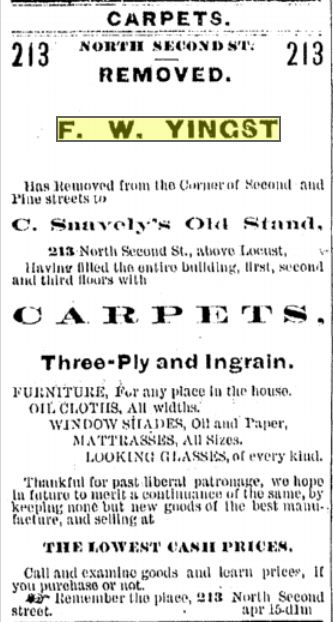
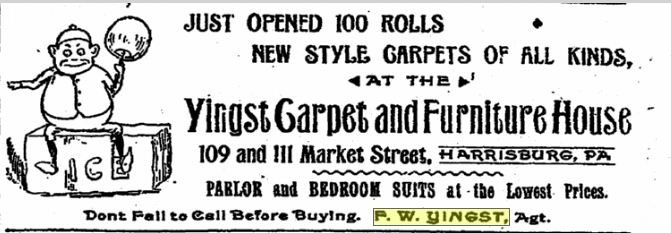
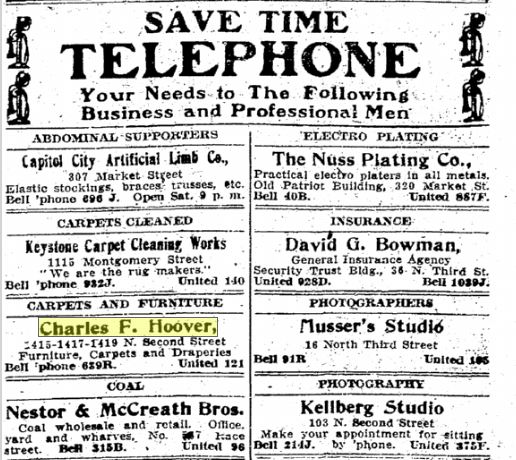
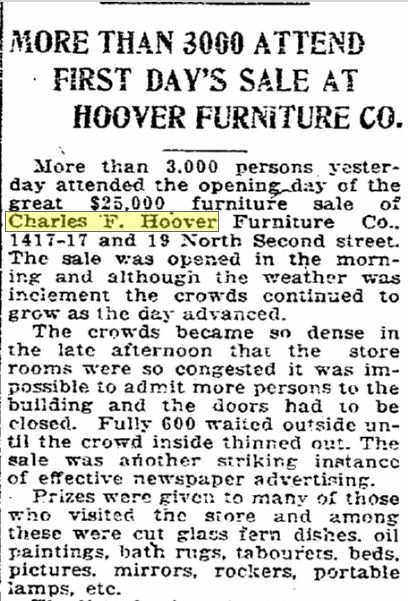
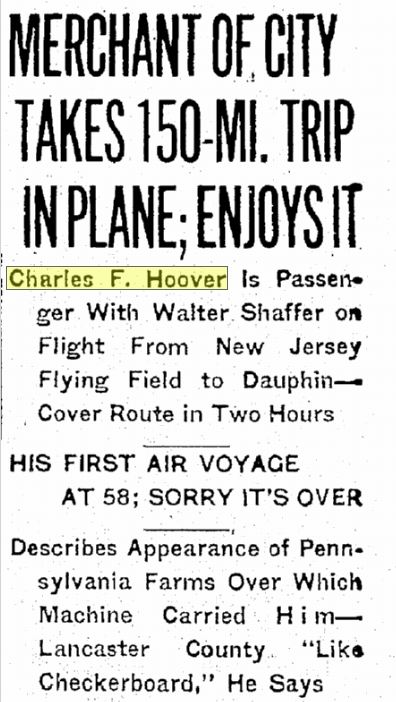


Comments